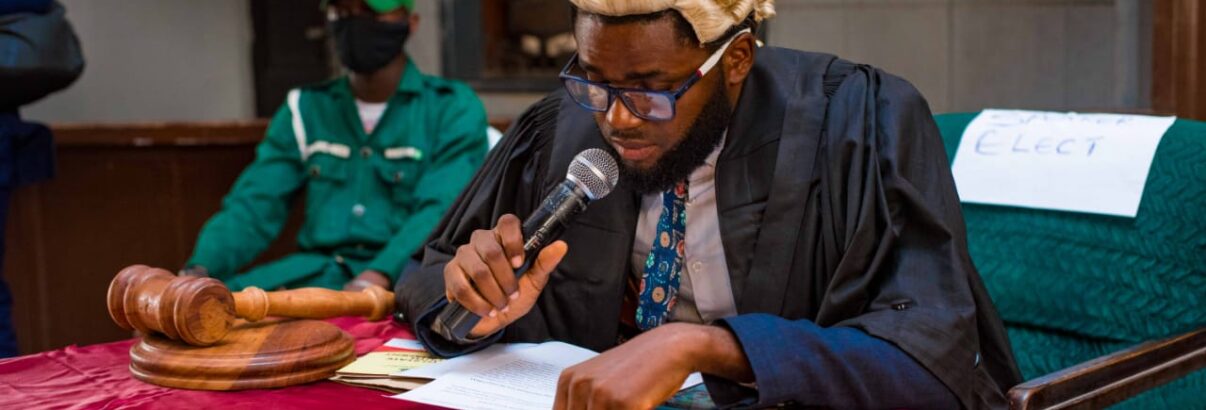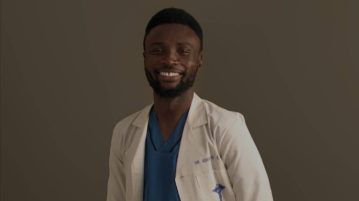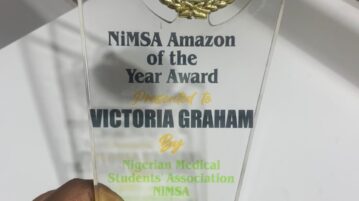Last month, Right Honorable Nurse Fawole Israel (a young health professional) was among the youth delegates to represent Nigeria at the Commonwealth Heads of Government Meeting (CHOGM) Rwanda 2022, in Kigali. Being at this global high level government meeting and as a member of the Commonwealth Youth Health Network; Our correspondent met up with him to chat about his participation and politics in the healthcare sector.
Medical Mirror (MM) Correspondent: Dr. Faeren Cynthia Atsehe, Dr. Mary Agoyi Awoniyi and Oyeniyi Blessing Oyeladun
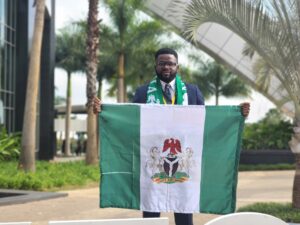
MM: Can you share with us how you ventured into politics from medical school, how you navigated through and rose into your current position?
Rt. Hon. Nr. Fawole Israel: First, I hate mediocrity, that is my first and major driving force. I started as a campus journalist, and through journalism, I advocated for so many developments. And most times because of my superior argument position, people started calling me to serve in a student representative position. So, I started as a general class rep. Following that, I thought to have a serious political revolution in the university I attended (LAUTECH), so I started “Change Movement” which was an acado-socio-political organization. A lot of people believed in the vision of the organisation and joined me. I’m happy to say, everyone who played a significant role in the organisation during our university days are all strong political figures now, and all held significant student union positions before we left school.
From being a class rep, I became a class SRC at the faculty level, where I rose to become the speaker of the faculty’s association. I was the first nursing student to hold that position. From there, our school got into the crises of funding and ownership, then I started the #ReOpen Lautech Struggle that year again, alongside my friend, Enike Oleghe. We drove the pressure group that later evolved to “Seral-C, Save Education, and Reopen Lautech Students Coalition” – a combination of several student pressure groups, where I served as the Spokesperson. On the 9th of January, 2018 I led a protest to reject a hike in the Lautech tuition fee, the pro-rich and anti-poor policies of the owner states of Lautech, and continuous closure of the school. During the struggle, we demanded a 21st-century budgeting and funding for education at all levels.
Following the success of this struggle and school re-opened, I registered my interest to serve as the National President of the Nursing Students Association in Nigeria. With so many track records and lots of support nationwide, I emerged – with a landslide winning margin – at the election. On getting into the office, I did a lot of work and handed over the baton in June 2020. After this, applications for the Oyo State Youth Parliament were advertised; I applied, was successfully shortlisted and people nominated me – secondary to my records – to serve as the speaker. There were other interests, which led to an election and again, I emerged with a landslide margin against my closest opponent.
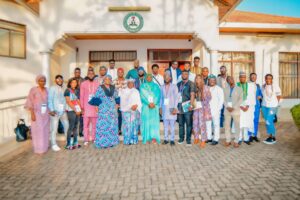
MM: Nice… So, what inspired you to stay in politics even after becoming a qualified health practitioner?
Rt. Hon. Nr. Fawole Israel: I strongly believe people are central to policies, as it affects our lives directly and indirectly. And it’s only through participation in politics that knowledge can be transferred to influence political decisions, the policy-making process, up to the point of implementation.
MM: Now, as a speaker and young politician in the youth assembly, what would you say is the most challenging part of your work and day-to-day interactions, especially with the older Nigerian politicians?
Rt. Hon. Nr. Fawole Israel: The most challenging part of the work is the knowledge gap. Bringing scientific methodologies into problem-solving, policy making, and implementation strategy. I think experience is not enough evidence to make policies.
MM: How then are you able to use your role in politics to impact people, communities and the health sector?
Rt. Hon. Nr. Fawole Israel: My current office gives me access to stakeholders across different works of life, so this has given me a good ground to gather information for healthcare needs, which serve as good evidence in proposing solutions to healthcare problems. So following this, we partner with relevant agencies and stakeholders, even academic institutions for fast, effective and sustainable inventions for identified needs.
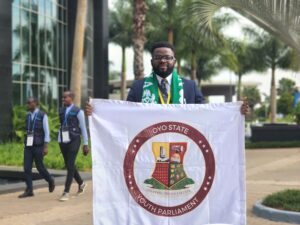
MM: Can you share some of your outstanding achievements in the significant positions held with us?
Rt. Hon. Nr. Fawole Israel: While I was the speaker of the basic medical sciences faculty, one of the things I achieved was to ensure that basic amenities in the college’s medical student hostel started working. For this course, my team and I wrote to several stakeholders through various means and our proposals were implemented. Today, when you get to Lautech, you will find that there is electricity in college. Back then, there was no electricity. Another product of my tenure as speaker was to ensure that the medical student library was put to use, and we did.
As the leader of #ReOpen Lautech Struggle, we made sure that Lautech is kept open and free of incessant strikes, unlike what it used to be. That year, one of the things we did to achieve this, after our protest to the governor’s office, was to have a meeting on invitation with the then senate president – His Excellency Dr. Bukola Saraki. During which we expressed our displeasure and stated our needs for the university. And of course, about 4.1 billion naira was later approved from the university’s Tetfund program, which is used to provide accommodation for students in school hostels. Likewise, during my campus journalism days, I advocated against and wrote about the incessant robbery and rape issue on campus, which got attention and brought about intervention from appropriate authorities.
Serving as the president of National Nursing Student of Nigeria, one of the things I did was getting our branding right by creating the logo and framework we use till date. This major restructuring helped us to become more effective and recognized in the global space. Also, I was able to bring to limelight the late Nurse Justina Ejelonu – who died of Ebola virus and worked alongside the late Dr. Stella Ameyo Adadevoh. Despite being a core part of that historic event in the Nigerian Healthcare sector, she had no national award or recognition. You would agree with me that nurses spend more time by the bedside of patients than doctors do. This would have led to her higher exposure to the infectious virus, causing her demise. She was a very young and brave nurse, who was pregnant at the time, with her wedding date fixed. She had the Ebola virus, died in the process of caring for a patient and nobody had celebrated her, an unsung hero. That year, I ensured that we – the National Nigerian Universities Nursing Students Association (NUNSA) – celebrated her and gave her a posthumous award.
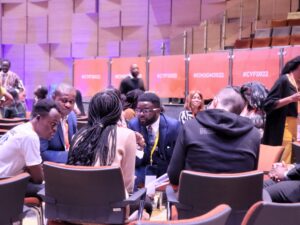
During the scourge of covid-19 pandemic in Nigeria, we were able to reach out to some international organizations. One of such was NANNNA (National Association of Nigerian Nurses in North America) through which we got a 5-10 thousand dollar grant used to procure PPE for nurses across the 36 states in Nigeria. We also did a number of intervention programs, grant making, distribution of hand washing items and sanitizers to students in some universities. For me, one of the most beautiful things we did as the national president of nursing students in partnership with INR (Institute of Nursing Research), was establishing the journal club across tertiary institutions in Nigeria. This we did in recognition of the existing lacuna for continuous academic study for nurses and nursing students. Largely due to the fact that most people found research very difficult. The goal of the organisation for creating the journal club was to help young nurses build capacities in research, assist them in evidence-based practice and build their capacities for higher scholarly endeavours. To the glory of God, since inception till now (I have the data), we have been able to train about three to four thousand nurses for capacity building on research.
On becoming the speaker of Oyo state youth parliament, I identified there was a deficit in the state’s girl-child education, especially in its allocated 2022 budget. To address this important issue, I reached out to one of the leading organisations who shared the same vision with my team on this, for partnership on education impact programs. By September, through the intervention funding we got from the Malala Fund (over three hundred thousand dollars), the organisation would be coming to Oyo state to implement the girl-child education intervention program in some regions of the state.
Also in Akinyele local government of the state, we have been able to organize some life saving skills training for about one thousand bike men, who were also given free head helmets. During this, we did basic medical check-ups on them, and we found about seven hundred of them had high blood pressure. Currently as we speak, we are partnering with a technology company designing a medical wearable device (like a wristwatch) that would help monitor the blood pressure of these commercial motorcycle riders in Oyo state. We are already producing about two thousand pieces, and this would be the pilot face of this project. It’s good to note that this project is personally funded by our partner organization.
Likewise, because we believe in the universality of sport, and we are currently refurbishing three sporting facilities across three communities in Oyo state. And Nigeria being the country with the highest rate of sickle cell in the world, we are currently carrying out a study to understand the factors responsible for this in partnership with the Departments of Nursing and Psychology in the University of Ibadan. This is to help develop academic intervention to solve this problem. For this course and more, we have trained about three hundred volunteers, who will be working with us to achieve some of our systematic interests.
These are a few of the outstanding things I’ve been able to achieve. Later in the coming months, my team and I would also be publishing our parliamentary agenda to the general public.
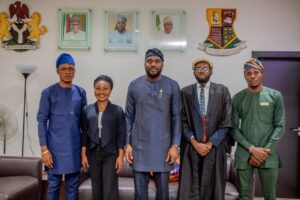
MM: Wow, that was a lot. So, you recently attended the “Commonwealth Heads of Government Meeting (CHOGM)” in Rwanda, can you give us an insight into this and its effect on our communities?
Rt. Hon. Nr. Fawole Israel: The meeting consists of delegations from 54 countries from Africa, the Caribbean, American, Asia, and the Pacific, which are Commonwealth member states. The goal of the CHOGM is to strengthen multilateral collaboration, explore new opportunities, and address shared concerns for future generations’ well-being. Every two years, Commonwealth leaders gather for the Commonwealth Heads of Government Meeting (CHOGM), which is hosted alternately by different member countries. Since 1971, there have been 24 of those meetings with the last recently held in the United Kingdom in 2018. However, CHOGM was originally scheduled for June 2020, but was twice postponed due to the COVID-19 epidemic.
The theme for this year was “Delivering a Common Future: Connecting, Innovating, Transforming”. This topic emphasizes innovation for long-term growth, policymaking, and governance responsibilities, which are all highly relevant to my current work as an Assembly Speaker. As I would be able to network, collaborate and co-create with the many senior government leaders from across the world who are also members of the meeting. This will greatly help my function in the state to make more impact through international networking, exchange programs and even meeting with the guest speakers for leading industries.
MM: Nice to know. However, does the Commonwealth Heads of Government Meeting (CHOGM) have any effect on health systems? If yes, what are they?
Rt. Hon. Nr. Fawole Israel: Definitely Yes! CHOGM is like a compendium or conference for head of governments coming together to discuss solutions to identified abounding human problems. During which policies are put forward. For example, concerning health, matters surrounding the social determinants of populations’ health were discussed at the just concluded CHOGM in Kigali. Important diseases were also discussed. One of such was Malaria, especially with it’s endemicity in Africa. Also cervical cancer, of which I remember pitching “youth involvement in decision making” as a solution during the conference. Furthermore, some of these ideas that was pitched to the CHOGM were adopted and a committee immediately set up to oversee the implementation process. One good thing about CHOGM is that, for any beautiful idea or policy that has been adopted, you can be rest assured that the Commonwealth would also fund and finance the implementation of such policy. So yes, they have very good impacts on our healthcare system.
MM: Is there any possibility of politicians paying more attention to health care, technology, and education in our societies, so they reach a level where basic health and educational needs of the poor can be met (this is in terms of free treatment or health insurance for common medical conditions and free basic education)? Do you think we are attaining this stage soon or not?
Rt. Hon. Nr. Fawole Israel: Yes, I think so. Through the active involvement of stakeholders in the healthcare sector who would champion and advocate these causes at the decision-making table, it is very achievable. I believe to attain free health care for common medical conditions; policies matter, and healthcare professionals have a lot of roles to play in politics to achieve the universal health coverage (UHC) as well.
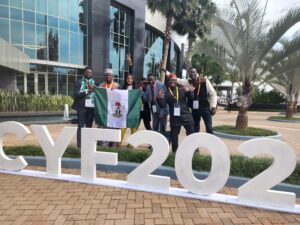
MM: There is a current mishap due to the recent event between a doctor and nurse in OAUTH. Any thoughts on this event?
Rt. Hon. Nr. Fawole Israel: I simply would advise that “we all should learn from the ants” and “everyone should do their jobs as politely as possible”.
MM: Still on interprofessional rivalry and collaboration in the health sector, what is your take on these issues and advice to healthcare practitioners?
Rt. Hon. Nr. Fawole Israel: Interprofessional collaboration in healthcare helps to prevent medication errors, improve patient experience and deliver better patient outcomes. These reduce healthcare costs and also help hospitals save money by shoring up workflow redundancies and operational inefficiencies. However, Interprofessional rivalry will give us the negative result of these supposed benefits from collaboration, and this is not kind enough for our healthcare system or nation as a whole. This can be supported by evidence from a Robert Wood Johnson Foundation study of 20 hospitals on “improving the interprofessional collaboration model between nurses and physicians”.
Nonetheless, the structural functionalist theory propounded by Talcott Parsons in 1951 will be a possible solution that can be adopted into making policies that address this issue. Also, appropriate research should be carried out to know the factors causing this rivalry and let it serve as evidence to influence policy to address this issue at once. The fundamental tenets of the theory I mentioned, are that society comprises related institutions that work together to ensure stability of the society. The theory sees society as a whole, in terms of the functions of its constituent elements, in which each element works together to ensure proper functioning of the body as a whole. This is likened to an organism that has different parts working together to ensure the survival of the organism. It is believed that if anything goes wrong with any part of the body, it will ultimately affect the proper functioning of the body as a whole, and as such, every part of the body is important to ensure the smooth functioning of the body.
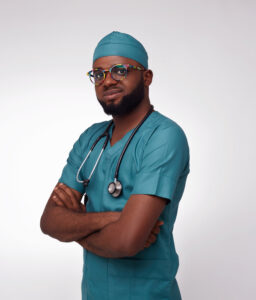
MM: How do you balance being a nurse and a politician? What challenges do you face and how do you overcome them? Will you still practice after your official appointment?
Rt. Hon. Nr. Fawole Israel: Well, I must confess – it’s not easy. It’s a lot of role conflict and stress, but I’m able to manage through effective communication. Yes, for sure I will practice Nursing, but might not be at the bedside. I’m in love with the Nursing profession and definitely will practice. Possibly, I aspire to work as a Health and Nursing Informatics specialist, utilizing new care trends and technology to improve preventive, curative, promotive, and rehabilitative healthcare initiatives towards achieving holistic care goals. I, as well, plan to work closely with patients, families, other healthcare providers, to influence policies, and bring latest and relevant research outcomes into practice, as evidence to support care.
MM: Brilliant choices, but what other options are there to explore in the nursing profession?
Rt. Hon. Nr. Fawole Israel: Nursing profession has about 301 career prospects. Personally, I have my interest in health and informatics, current trends and technology in giving nursing care, as I already mentioned. Another option is nursing education. Nursing academics and research are very important to influence policy. Also, the health tech space is still growing in Africa and we still need more people to join. Likewise, I think I am interested in health journalism as well, health financing, health economics and health policy making. These are some options for career trends in Nursing.
MM: Thank you for the robust conversation. What are your final words for the healthcare professional with political ambitions, and the general public?
Rt. Hon. Nr. Fawole Israel: We need more healthcare professionals in politics to bring the desired transformation in tandem with global standards to our country. The health of our nation lies in the policies we make. I strongly believe in the Knowledge-Attitude-Practice (KAP) model to approach problems, because knowledge drives action. Therefore, our knowledge and passion are needed. No one else will better advocate for favourable budgets, welfare state of health workers, patient rights, or policies for the health care sector in Nigeria, if we are not involved. True, It takes strong political will to achieve significance in politics, but it is a game of numbers, the majority carries the vote. Hence, nothing should stop us, as we all have a role to play in building our nation.
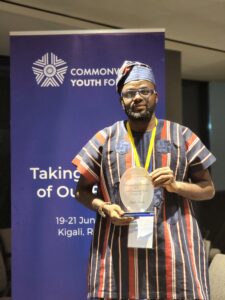
About Rt. Hon. Nr. Fawole Israel:
Fawole Israel is a Registered Nurse who was appointed as a member of the Oyo State Youth Parliament 2nd Assembly in December 2021, and became the Speaker of the Parliament in February 2022. He previously served as Speaker, Faculty of Basic Medical Sciences Students Association (2015-2017) while studying at the University of Excellence, Ladoke Akintola University of Technology Ogbomosho, and the National President of Nigerian Universities Nursing Students Association (2019-2022), among many other leadership positions. He was also inducted into the Sigma Theta Thou international honor society in 2021, at Obafemi Awolowo University in Ile Ife (Alpha Alpha Upsilon, Chapter).
As an award-winning undergraduate journalist and young nurse professional his works have also earned him a feature in Forbes Magazine’s March 2022 issue, which is titled “Nursing: The Finest Art”. He is also the liaison officer and research data analyst of the Institute of Nursing Research, Nigeria with a global audience, in partnership with the world’s largest nursing organization, International Council of Nurses (ICN).

